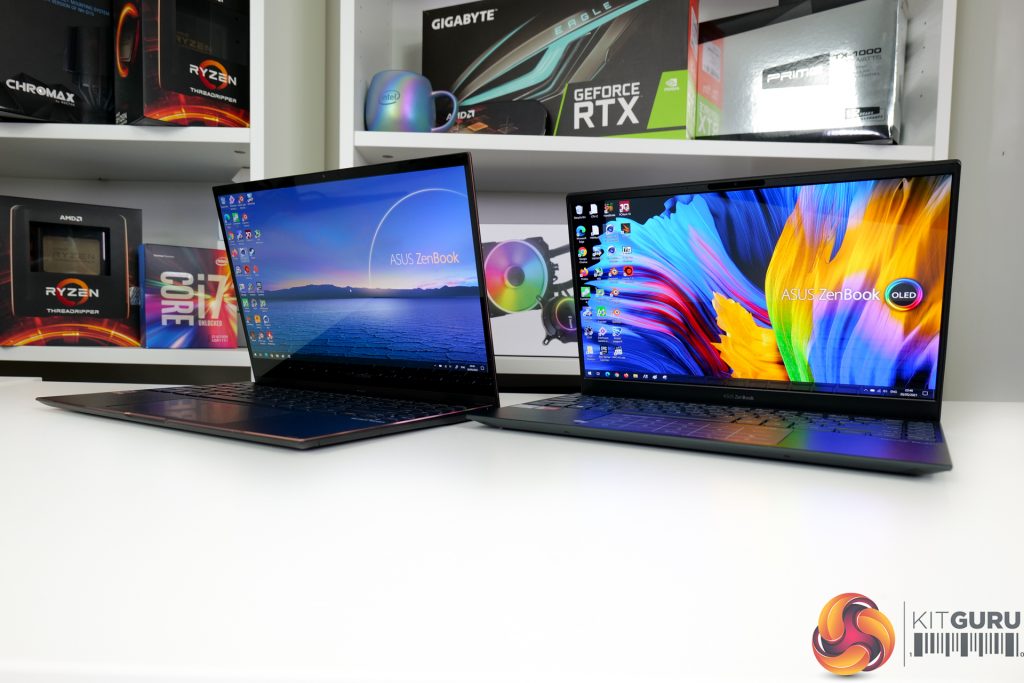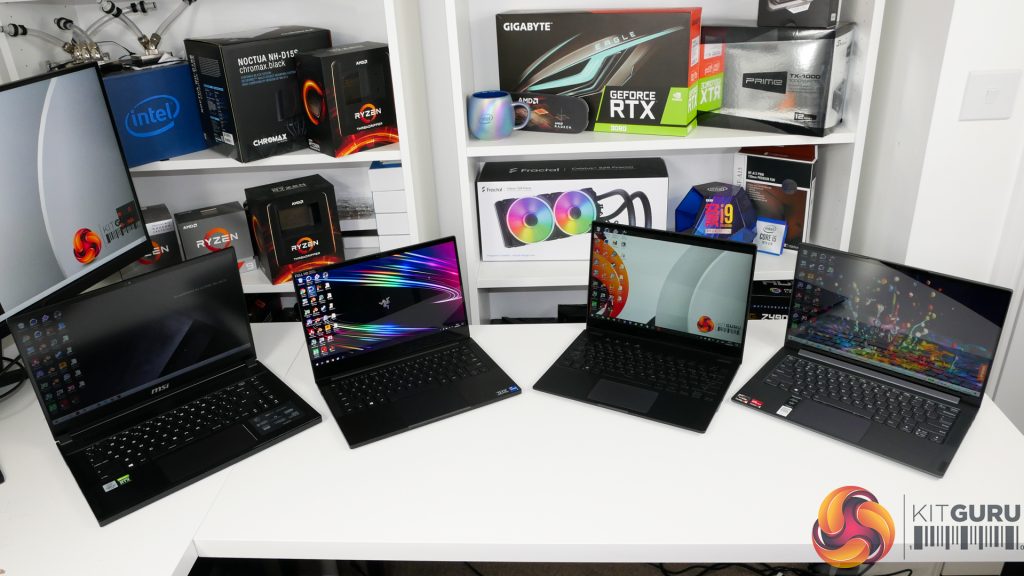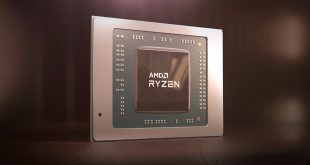We test in the out-of-the-box state with minimal adjustments made to the laptops, other than installing our test software and Windows updates in addition to removing McAfee which is simply infuriating (ASUS, please stop including this!).
That means that each laptop is tested using its ‘Standard’ fan and power profile. For the Ryzen 7 5800U, that means a roughly 12-15W long duration power delivery, and for the Core i7-1165G7 that is 12W long duration power delivery.
We also add some testing in the ‘Performance’ cooling mode which ramps up the fan a little and increases the CPU power delivery. For the Ryzen 7 5800U that means around 18-21W long duration power delivery and the Core i7-1165G7 is around 15W long duration power delivery.
We include some comparison data from relevant laptops that we have tested recently. One important note is that we have included comparison data from the Lenovo Yoga Slim 7 14” laptop that equips the Zen 2 Ryzen 7 4800U processor that the Zen 3 5800U replaces. This Lenovo laptop, however, runs that older chip at a considerably higher power allocation of around 25W+ for long duration runs.
As such, the older Zen 2 Ryzen 7 will often appear faster than the newer Zen 3 Ryzen 7, but this is realistically due to different power budgets from the laptop makers – and not the APUs themselves.
Lightly- and single-threaded comparisons will highlight the proficiencies of the new Ryzen 7 5800U without the power shackles that are not comparable with the Ryzen 7 4800U device. This is an important observation to bear in mind.
ASUS ZenBook 13 OLED UM325S Laptop Test Configuration:
- Processor: AMD Ryzen 7 5800U (8C/16T, 1.9GHz Base, up to 4.4GHz Boost, 15W Rated TDP)
- Memory: 16GB LPDDR4X 3733MHz
- Graphics Card: Integrated Radeon Vega 8 APU (up to 2GHz)
- Display: 13.3” 16:9 FHD 1920×1080 60Hz OLED Display
- System Drive: 1TB SK Hynix (HFM001TD3JX013N) NVMe SSD
- Battery: 67 Whr battery with 65W USB-C Power Adapter
- Design: 1.12kg weight with 13.9mm chassis thickness
- Operating System: Windows 10
ASUS ZenBook Flip S OLED UX371 Laptop Test Configuration:
- Processor: Intel Core i7-1165G7 (4C/8T, 1.2GHz Base, 12W Rated TDP-down Mode)
- Memory: 16GB LPDDR4X 4266MHz
- Graphics Card: Integrated Intel Iris Xe iGPU (96 EUs up to 1.3GHz)
- Display: 13.3” 16:9 UHD 3840×2160 60Hz OLED Touch Display
- System Drive: 1TB WD SN730 NVMe SSD
- Battery: 67 Whr battery with 65W USB-C Power Adapter
- Design: 1.2kg weight with 11.9-13.9mm chassis thickness
- Operating System: Windows 10
Comparison Systems:
- ASUS ROG Flow X13 (Ryzen 9 5980HS ‘Cezanne' System)
- AMD Ryzen 9 5980HS (8C/16T, 3.0GHz Base, up to 4.8GHz Boost, 35W Rated TDP)
- 32GB LPDDR4X 4266MHz
- 4GB Nvidia GTX 1650 Max-Q (35W Tested Operation)
- 13.4” 16:10 UHD 3840×2400 60Hz IPS Touch Display
- 1TB WD SN530 NVMe SSD
- 62 Whr battery with 100W USB-C Power Adapter
- 1.3kg weight with 15.8mm chassis thickness
- Razer Blade Stealth 13 OLED (Core i7-1165G7 ‘Tiger Lake’ System)
- Intel Core i7-1165G7 (4C8T, 28W Rated TDP)
- 16GB LPDDR4 4266MHz
- Nvidia GTX 1650 Ti Max-Q
- 13.3″ OLED Full HD Touch 60Hz
- 512GB Samsung NVMe SSD
- 53.1 Whr battery with 100W USB-C Power Adapter
- 1.41kg weight with 15.3mm thickness
- MSI GS66 Stealth 10SGS (Core i9-10980HK ‘Comet Lake-H’ System):
- Intel Core i9-10980HK (8C/16T, 45W Rated TDP)
- 16GB DDR4 2666MHz
- Nvidia RTX 2080 Super Max-Q (80W Tested Operation)
- 15.6″ IPS-Level Full HD 300Hz
- 1TB Samsung NVMe SSD
- 99.9 Whr battery with 230W Power Brick
- 2.1kg weight with 18.3-19.8mm thickness
- Lenovo Yoga Slim 7 14ARE05 (Ryzen 7 4800U ‘Renoir’ System):
- AMD Ryzen 7 4800U (8C16T, 25W Rated TDP)
- 16GB LPDDR4 4266MHz
- AMD Radeon Vega 8 iGPU
- 14″ IPS Full HD 60Hz
- 512GB SK Hynix PC401 NVMe SSD
- 60.7 Whr battery with 65W USB-C Power Adapter
- Around 1.4kg weight with thickness just under 15mm
- Razer Blade 15 Advanced (Core i7-10875H ‘Comet Lake-H’ CPU):
- Specifications HERE
Tests
- Cinebench R20 – All-core & single-core CPU benchmark (CPU Compute), Stress test (Temperatures & Power Consumption)
- Cinebench R23 – All-core & single-core CPU benchmark (CPU Compute), Stress test (Temperatures & Power Consumption)
- Blender 2.91.2 – All-core rendering of the Classroom and BMW scenes (CPU/GPU Compute), Stress test (Temperatures & Power Consumption)
- HandBrake H264 – Convert 1440p60 H264 video to 1080p60 H264 using the YouTube HQ 1080p60 preset (CPU)
- HandBrake H265 – Convert 4K30 100Mbps H264 video to 1080p30 40Mbps H265 using the H.265 MKV 1080p30 preset (CPU & Memory)
- 7-Zip – Built-in 7-Zip benchmark test (CPU & Memory)
- SiSoft Sandra – Memory bandwidth and Cache & Memory Latency Test (Memory)
- AIDA64 – Memory bandwidth & memory latency (Memory)
- PCMark 10 – Modern Office & Battery Life Test (System Performance & Battery Life)
- 3DMark – Time Spy (1440p) test, Night Raid (1080p) test (Gaming)
Be sure to check out our sponsors store EKWB here
 KitGuru KitGuru.net – Tech News | Hardware News | Hardware Reviews | IOS | Mobile | Gaming | Graphics Cards
KitGuru KitGuru.net – Tech News | Hardware News | Hardware Reviews | IOS | Mobile | Gaming | Graphics Cards




